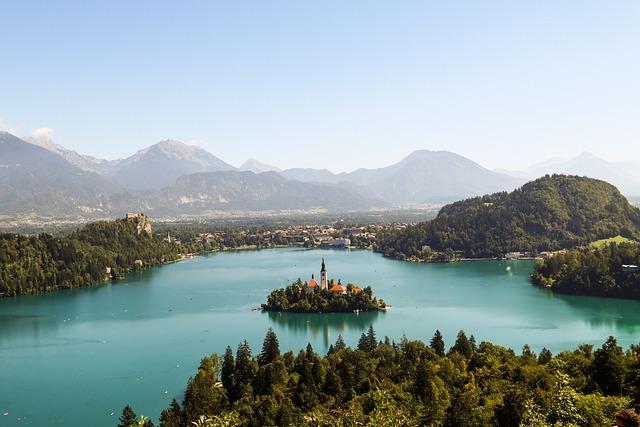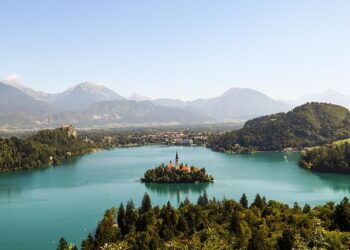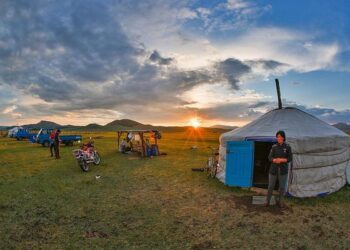As global migration patterns continue to evolve,the OECD’s “International Migration Outlook 2024” offers crucial insights into the dynamics of migration across the world,with a particular spotlight on Slovenia. Situated at the crossroads of central and Southern Europe, Slovenia’s unique geopolitical position, coupled with its economic landscape and societal trends, makes it a focal point for understanding broader migration trends in the region. This year’s report delves into various dimensions of migration, including economic impacts, demographic changes, and integration policies, shedding light on the challenges and opportunities that Slovenia faces in navigating the complex terrain of international migration. As policymakers and stakeholders prepare to utilize these insights,the findings underscore the importance of strategic planning and effective governance in fostering a cohesive and inclusive society amidst shifting migratory currents.
Understanding Slovenias migratory Trends and Demographics in 2024
As Slovenia enters 2024, its migratory trends reflect broader European patterns while also exhibiting unique national characteristics. The country has seen a steady influx of migrants, driven by both economic opportunities and a favorable quality of life. In recent years, the urban areas of Ljubljana and Maribor have attracted a significant number of young professionals seeking employment in various sectors, including technology, healthcare, and tourism.This demographic shift has contributed to a vibrant multicultural landscape and has prompted local authorities to adopt inclusive policies aimed at integrating newcomers into society.
Demographically, the diversity brought by international migration is reshaping Slovenia’s population structure. The government’s statistics indicate a marked increase in the percentage of foreign-born residents, which has led to a rich tapestry of cultural influences. Notably, the top countries of origin for migrants include:
- Serbia
- Croatia
- Bosnia and Herzegovina
- North Macedonia
- Germany
This diversity not onyl enhances the labor market but also poses challenges in terms of social cohesion and public policy.The government is tasked with balancing the benefits of a growing labor force against the need for sustainable integration practices. With ongoing initiatives aimed at fostering dialog among different communities, Slovenia strives to create a harmonious environment where every resident feels valued and engaged.

Evaluating Economic Contributions of Migrants in Slovenia
The economic contributions of migrants in Slovenia are significant and multifaceted, playing a crucial role in bolstering the nation’s labor market and stimulating growth across various sectors. Migrants fill essential job vacancies, especially in industries facing labor shortages, such as healthcare, construction, and hospitality. Their participation not only helps to sustain vital services but also enhances productivity by introducing diverse skills and perspectives into the workforce. Moreover, the contributions of migrants extend beyond immediate employment benefits, as they actively engage in entrepreneurship, establishing businesses that create additional jobs and drive economic innovation.
Further analysis reveals the positive fiscal impacts stemming from the migrant population in Slovenia. Key benefits include:
- Increased tax revenues, as migrants contribute through income taxes and consumption taxes.
- Lower dependency ratios, as migrants tend to be younger and frequently enough support the aging native population.
- Enhanced social security contributions, bolstering the sustainability of welfare systems.
A recent study indicates that the average annual economic output per migrant is approximately €30,000, showcasing their vital role in maintaining economic dynamism. In the context of Slovenia’s demographic challenges, fostering an environment conducive to migrant integration is essential for continued prosperity and stability.

Policy Challenges Facing Slovenia in the Context of International Migration
Slovenia faces several policy challenges in the realm of international migration that require immediate attention and strategic planning. As a key transit and destination country within the European Union, Slovenia must navigate the complexities of growing migrant flows while balancing national interests with humanitarian commitments. Key issues include:
- Integration of Migrants: The challenge of effectively integrating newcomers into Slovenian society, notably in areas such as language acquisition, employment, and social inclusion.
- Border Management: Enhancing border security while ensuring compliance with EU directives on asylum seekers and refugees.
- Public Sentiment: Addressing growing concerns among the local population regarding the impact of migration on society and resources.
Moreover,Slovenia’s approach to international migration necessitates collaboration at both the national and EU levels. Policymakers must ensure that migration strategies are aligned with broader EU objectives and best practices. additionally, there is a pressing need for policies that address:
- Labor Market Needs: Formulating immigration policies that respond to specific labor shortages in various sectors.
- Human Rights Obligations: Upholding the rights of migrants, especially vulnerable groups, in line with international human rights agreements.
- Regional Cooperation: Strengthening partnerships with neighboring countries to manage migration flows collaboratively.

Strategies for Enhancing Integration and Social Cohesion in Slovenia
To effectively foster integration and social cohesion in Slovenia, it is indeed critical to implement a range of strategies that target various aspects of society. Community engagement initiatives serve as a cornerstone for accomplished integration, where local organizations collaborate with migrants and native populations. Such initiatives can include:
- Cultural exchange programs that promote understanding and recognition of diverse heritages.
- Language learning workshops designed to help migrants communicate effectively, thereby enhancing their participation in local life.
- Mentorship schemes pairing newcomers with local residents to create lasting relationships and networks.
Additionally,enhancing access to social services and employment opportunities is vital for reducing barriers to integration. Establishing job placement programs that connect migrants with local businesses can not only stimulate the economy but also encourage social ties. Key actions may include:
- tailored job training sessions that address market needs while considering migrants’ skills.
- Support for entrepreneurial initiatives within migrant communities to facilitate economic self-sufficiency.
- Awareness campaigns to educate the public about the benefits of diversity in the workforce.

Future Prospects: Slovenias Role in Global Migration Dynamics
As Slovenia navigates the terrain of global migration dynamics, its geographical position as a gateway between Eastern and Western Europe is poised to play a vital role.With its burgeoning economy and commitment to integrating migrants into the workforce, Slovenia can leverage its favorable demographic conditions to address labor shortages and enhance economic productivity.The government is advocating for policies that not only welcome migrants but also promote diversity and social cohesion. This proactive approach highlights several key areas for the future:
- Targeted immigration policies: Developing frameworks that respond to specific labor market needs.
- Integration programs: Enhancing initiatives to support the cultural and economic integration of newcomers.
- Partnerships with international organizations: Collaborating with entities like the OECD to adopt best practices in migration governance.
Moreover, Slovenia’s dedication to maintaining a balanced demographic profile positions it as an influential actor within the EU’s migration discourse. As patterns of migration evolve due to climatic,economic,and geopolitical shifts,Slovenia’s ability to adapt and respond effectively to these changes will be crucial.The country can benefit from:
- Research and data analysis: Conducting studies to understand migration trends and their impacts.
- Public awareness campaigns: Educating citizens about the benefits of immigration for national growth.
- Regional cooperation: Engaging with neighboring countries to manage cross-border migration effectively.
| Migration Factor | Impact on Slovenia |
|---|---|
| Labor Demand | Increased availability of skilled labor in key sectors |
| Diversity Promotion | Strengthened cultural exchange and innovation |
| Economic Growth | Boost in GDP through contributions from migrants |

Insights and Conclusions
the “International Migration Outlook 2024: Slovenia” report by the OECD presents a nuanced perspective on the evolving dynamics of migration within Slovenia.As the country navigates the complexities of demographic shifts, labor market demands, and social integration, it stands at a crossroads that could significantly shape its future. The findings underline the importance of adaptive policies that not only address immediate challenges but also leverage the potential benefits of migration for long-term economic growth and cultural enrichment.Moving forward, Slovenia must balance its commitments to humanitarian principles with the practicalities of fostering an inclusive society that promotes both prospect and cohesion. As global migration patterns continue to change, Slovenia’s approach will be crucial not just for its domestic landscape but also as a part of the broader European migration narrative. The journey ahead will require cooperation, foresight, and a commitment to embracing diversity as a catalyst for progress.
















